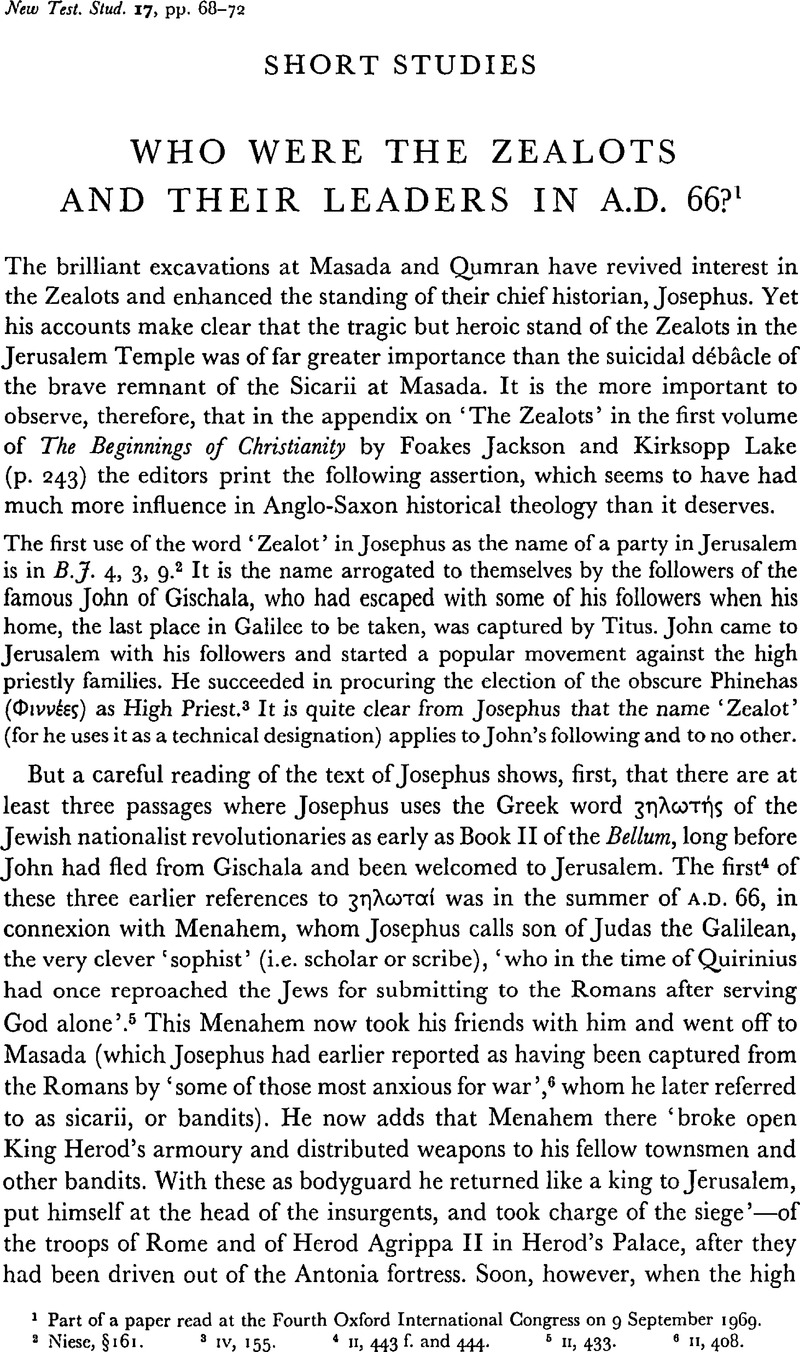Article contents
Who were the Zealots and their Leaders in A.D. 66?1
Published online by Cambridge University Press: 05 February 2009
Abstract

- Type
- Short Studies
- Information
- Copyright
- Copyright © Cambridge University Press 1970
References
page 68 note 2 Niese, § 161.
page 68 note 3 IV, 155.
page 68 note 4 II, 443f. and 444.
page 68 note 5 II, 433.
page 68 note 6 II, 408.
page 69 note 1 II, 442.
page 69 note 2 II, 409 (πολέμου καταβολέ).
page 69 note 3 II, 444. This first mention by Josephus of ‘zealots’ in the followers of this (grand?-) son of Judas the Galilaean (II, 433) has perhaps escaped notice partly because Thackeray in the Loeb Edition (p. 493) translates τούς Зηλωτάς Зνόπλους έφελκόμευος as ‘attended by his suite of armed fanatics’— as though there was an αύτο⋯ in the text; but he appends a footnote ‘Greek “zealots”’, and R. Traill, in his 1851 translation, which marks a great advance upon Whiston's, renders it ‘attended by the zealots under arms’. These must surely have been some of the same people called (in II, 433, cited above) Menahem's ‘fellow townsmen and other bandits’ (λῃσταλ)— the term Josephus often uses disparagingly of Jews who must have called themselves (inter alia) quanaim after the ‘jealous God’ of Exod. XX. 5, etc., which the LXX always translates by Ζηλωταλ (cf. Stumpff in TWNT, II, 880Google Scholar f., and Hengel, M., Die Zeloten, pp. 42 ff., 68 ff.Google Scholar). The word does not mean ‘fanatics’ either in its Classical sense of ‘admiring emulators’ nor in its LXX usage, however much Josephus and others may have wanted to apply it to the ultra-legalistic followers of Phineas, Elijah and Matathias so described in the LXX. It seems that Josephus is here using the term in its LXX sense, applying it to some who died with Menahem and others who later defended Masada, whom he normally calls σικάπιοι.
page 69 note 4 II, 447.
page 69 note 5 II, 427.
page 70 note 1 II, 564. The English citations from the Bellum Judaicum here are all given in G. W. Williamson's translation The Jewish War (by kind permission of Penguin Books Ltd, who hope to add Niese's paragraph numbers in their next edition), except that he here translates ![]() ‘his devoted followers’, following Thackeray's his subservient admirers’ (Loeb, II, 541). This is taking ζηλωτής in its Classical Greek sense, undoubtedly used by Josephus in IV, 161 (asserted to be his first use of it in Jackson and Lake's passage cited above), but then one would have expected the possessive genitive rather than
‘his devoted followers’, following Thackeray's his subservient admirers’ (Loeb, II, 541). This is taking ζηλωτής in its Classical Greek sense, undoubtedly used by Josephus in IV, 161 (asserted to be his first use of it in Jackson and Lake's passage cited above), but then one would have expected the possessive genitive rather than ![]() , and the question is surely decided by V, 250, which refers to Eleazar ben Simon as the 'old commander’ still in office of ‘the Zealots, who had laid aside their quarrel’—with the other main nationalist leaders Simon and John, after the latter had seized the Temple. It is a curious fact that the Indices at the end of vols. III and IX of the Loeb Edition, under the entry 'Eleazar son of Gion or Simon’, refer to him as 'leader of Zealots’ in this passage, despite Thackeray's translation in the text—and the consequent omission of the passage under 'Zealots’ in each Index. The phrase ‘the Zealots under him’ (Eleazar) suggests of course that there were already Zealots under other leaders—such as the ‘Galilaean contingent’ (σύυταυμα) (IV, 558), who by then ‘had put power in the hands of John’ and were at this time presumably in and near Gischala.
, and the question is surely decided by V, 250, which refers to Eleazar ben Simon as the 'old commander’ still in office of ‘the Zealots, who had laid aside their quarrel’—with the other main nationalist leaders Simon and John, after the latter had seized the Temple. It is a curious fact that the Indices at the end of vols. III and IX of the Loeb Edition, under the entry 'Eleazar son of Gion or Simon’, refer to him as 'leader of Zealots’ in this passage, despite Thackeray's translation in the text—and the consequent omission of the passage under 'Zealots’ in each Index. The phrase ‘the Zealots under him’ (Eleazar) suggests of course that there were already Zealots under other leaders—such as the ‘Galilaean contingent’ (σύυταυμα) (IV, 558), who by then ‘had put power in the hands of John’ and were at this time presumably in and near Gischala.
page 70 note 2 IV, 147–57. The Loeb text in 155 calls the clan 'Ενιάχ;ιν, but the sentence needs a relative particle, so Lowth conjectured ἢ λακλμ—the clan listed in I Chron. xxiv. 12 as the twelfth descended from Eleazar. But the twenty-first in this Aaronite list is ‘Jachin’, which is nearer to the MSS in this Josephus passage, and is therefore suggested. It also occurs in I Chron. ix. 10 and Neh. xi. 10.
page 71 note 1 Josephus thinks worst of all the priestly Jerusalem zealots, as those who made the Inner Temple their ϕρούριου καλ … καταϕυγή (IV, 151), which led to its defilement by bloodshed and almost total destruction by the Romans.
page 72 note 1 Josephus thinks worst of all the priestly Jerusalem zealots, as those who made the Inner Temple their ![]() (IV, 151), which led to its defilement by bloodshed and almost total destruction by the Romans.
(IV, 151), which led to its defilement by bloodshed and almost total destruction by the Romans.
page 72 note 2 V, 402.
- 3
- Cited by


